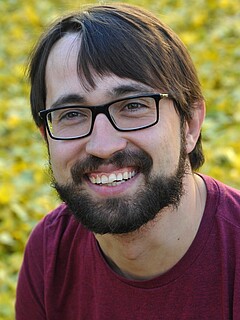PhD students 1st cohort

Dr. des. Marc Emmerich
marc.emmerich@gmail.com
Curriculum Vitae
Marc Emmerich (born 1985) studied a Bachelor of Philosophy and Indogermanic Studies at FSU Jena from 2005 to 2010. He also completed his Master of Social Theory at FSU Jena between 2010 and 2013. During his studies he was an assistant to the chair of Indogermanic studies in the ‘Historic Syntax of Yiddish’ project and at the European Romanticism research office at FSU Jena. He has been a PhD student at the ‘Romanticism as a Model’ research training group since October 2015 through September 2018.
PhD project (submitted)
Between Volonté Générale and Participatory Democracy: Romantic Models of Reconciliation of Specific Interests and the Common Good
In the discussion about ‘political Romanticism’, the dominant trend has been to perceive German Romanticism as a conservative movement and precursor to National Socialism since the 19th century. In more recent times this reductionist approach is being increasingly questioned. If Romanticism and conservatism do not fit together smoothly, by implication the question arises as to whether Romanticism has had more positive relationship with progressive movements than previously expressed. Nevertheless, Carl Schmitt’s critique of ‘political Romanticism’ still actually aims to defend bourgeois liberal democracy.
That Romanticism must have something to contribute to discussions about democracy appears evident in that it emerged in the immediate contemporary context of a transformation of the classical understanding of democracy. Between 1780 and 1800 democracy changed from a scholarly to a politically charged movement that forced urban forms of democracy to shift to a national stage.
Assuming that the democratic or republican ideas of the romantics have to be addressed, the PhD project examines how these ideas evolve into Romanticising reflections, intensify, and develop into particular responses to reconcile specific interests and the common good.
The project is initially dedicated to urban republicanism in the Middle Ages so that its ‘Romanticisation’ can be adequately grasped. The key question is how existing, regionally limited democratic systems within the Romantic perspective are reflected in a universal totality. It will then be shown how the Romantic perspective is adopted and augmented in the democratisation of Charles Taylor or Benjamin Barber, for example, so that the importance of Romanticism as a hinge between urban republicanism and modern participatory democracy becomes apparent.
Publications
Aufsätze
„Der Streit um die Einbildungskraft. Spuren des Politischen in E.T.A. Hoffmanns Fräulein von Scuderi“, in: Aida Bosch/Hermann Pfütze (Hg.): Ästhetischer Widerstand gegen Zerstörung und Selbstzerstörung, Wiesbaden 2017, S. 221-230.
„The Creative Force of Discourse and the Appearance of Politics: Reading Charles Taylor with the Political Theory of Jacques Rancière“, in: Dialogue, Canadian Philosophical Review, Volume 56, Issue 4, Dezember 2017, S. 705-715.
„Das Unvernehmen in Romantik und Surrealismus“, in: Sebastian Lübcke, Johann Thun (Hg.): Romantik und Surrealismus. Eine Wahlverwandtschaft?, Berlin et. al. 2018, S. 167-182.
Kleinere Beiträge
(Zs. mit Mirjam Sauer/Hendrick Heimböckel): Tagungsbericht: Funktionen der Einbildungskraft um 1800, Jena, 01.03.2018-02.03.2018, in: H-Soz-Kult, 18.06.2018
Presentations
Das Unvernehmen in der Literatur von der Romantik zum Surrealismus [CIERA – Interdisziplinäres Zentrum für Deutschlandstudien und -forschung: Romantisme et Surréalisme. Eine Wahlverwandtschaft?/ Une affinité elective?, Université Lyon II, 18.-19. März 2016]